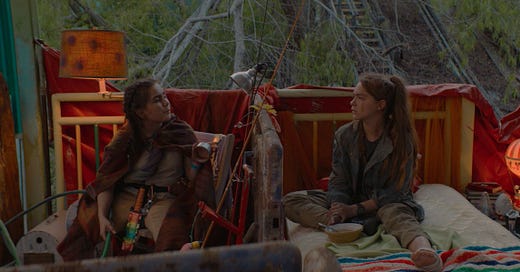The Park
"The Park" is a profound debut feature from Shal Ngo that forces the viewer to think and ultimately lament the loss of childhood innocence we all must face in the end.
I didn't expect much out of "The Park" when I chose to review it. I knew I'd probably like it because I like quirky and offbeat things that don't usually appeal to others, but it had some things working against it. It's a debut feature, primarily young actors leading the way, and it's set in a single location. Not making something that should leave much of an impression, but that's precisely what "The Park" did in a big way.
Writer/Director Shal Ngo delivers an unexpectedly profound movie that works well on many levels. Ngo utilized the New Orleans Six Flags, abandoned in 2005 after Hurricane Katrina, to craft the world of "The Park," giving the film a unique feel that is family and otherworldly. It's somewhere we feel safe and at home, but it also makes the hairs on the back of our neck stand at attention.
"The Park" is the story of a world where a virus has wiped out all the adults and the kids are left to run the show. The "Lord of the Flies" vibe plays well with Ines (Chloe Guidry) and Bui (Nhedrick Jabier) trying to navigate the world, staying alive on what they can find or what they can steal. Things get interesting when after they kill a young kid hoping he has some water and they stumble upon an abandoned amusement park in the woods.
Ines scopes out the area and sees a collection of water the duo can't live without – literally. So, she makes her move and pretends to be injured in an attempt to catch Kuan (Carmina Garay), the park's keeper, off guard and take the water. However, when she steals Kuan's gun, she finds out it's a toy and the world of the park begins to reveal that not everything you think is real is, in fact, a reality.
Kuan is a dream, and her vision of the future isn't one of a cure but one where she has created a place for all the abandoned youths to come and enjoy together. Nothing makes this more evident than when after capturing Bui, she puts him to work supplying water for a makeshift water park ride. After encouraging Ines to see the future, she pushes her down the slide and it awakens something inside Ines that forces her to realize the path she has been walking isn't correct.
But as Ines and Kuan's relationship grows stronger, Bui grows more resentful, creating a rift between himself and Ines. At one point, he escapes his restraints and challenges Ines to choose between him and Kuan, but before she can, Kuan is taken by the virus and the Blue Meanies, menacing young adults in blue raincoats, are upon them. Rumors abound of the Blue Meanies and their purpose.
Ines and Bui manage to escape but are soon taken down by the Blue Meanies and discover that, just like the park, what you think you know isn't always true.
This film was genuinely unexpected. It won't be everyone's cup of tea and many will want to focus on the sometimes stiff acting or odd story choices, such as if you're fighting for supplies with everyone and trying to keep off the Blue Meanies radar, why would you light up an amusement park or light off fireworks. If you do that, you're not doing this film justice.
"The Park" makes you think and question your beliefs, which I loved. For me, the virus is the loss of childhood innocence we all face and don't realize it's gone until it's too late. We all have an abandoned amusement park inside that we hope to revisit someday, kick on the lights and enjoy once again.
I'm not going to spoil anything, but I thought the "cure" for the virus was also an interesting choice. It goes hand-in-hand with lost innocence because when we transition from childhood to adulthood, we lose pieces of ourselves, the most important of which is our authentic voice. And to me, that is the most tragic thing any of us can lose.
Guidry and Garay are spectacular and shine bright. Both actresses deliver the goods and carry this movie well.
"The Park" is a profound debut feature from Shal Ngo that forces the viewer to think and ultimately lament the loss of childhood innocence we all must face in the end.




